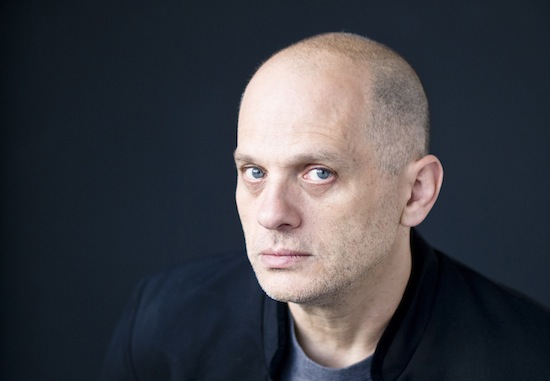"What happens when we are here one moment and gone the next?", was the question posed to the audience in the Queen Elizabeth Hall by composer David Lang, who had been dropping his children off at school in Lower Manhattan on the morning of September 11, 2001. "If you talk to us for more than five minutes you will soon realise how traumatised we all are," he went on to say, but his concerto for cello and orchestra, World To Come, is not one of memorial, rage or protest; it simply asks the question: "Where did all those New Yorkers go who were alive that morning and then not?"
Lang is a deeply thoughtful man who allows his music to ask the big questions, and most recently these have been about death, talk of which was very present throughout his childhood as his mother was a refugee from Nazi Germany. But Lang’s questioning does not shout or beg to be answered, rather it relies on the concentration and the internal questioning of the listener. In front of the BBC Concert Orchestra and vocalist and cellist Maya Beiser, performing the UK premiere of Lang’s World To Come, I found myself ruminating over Lang’s question – of course what followed was introspection.
World To Come begins with the voice and cello in unison, but they are soon separated and the cellist, who uses her voice throughout the piece, be it singing or breathing, works to reunite the two disparate parts of her being. And this is the musical rendering of Lang’s question, the two modes of performance, solo voice and solo cello, representing the idea of loss – of the physical world and the soul being separated. Lang’s evocative music, which he refuses to see as beautiful, certainly paves the way for rhapsodic imaginings in the mind of the listener, but there is suffering and darkness within his rhythmic fragments that are, by necessity, worked out by the cellist like a series of ever modulating puzzles to arrive at longer strains of melody. When the melody did finally arrive it was ancient and folk-like – and because we had been listening to it take form right in front of us, it also sounded like a welcome half-remembered tune from our own memory.
Beiser’s performance was one of labour, sometimes seemingly effortless but never complacent, for Lang’s rhythmic puzzles needed absolute precision as well as beauty – something which was certainly delivered. Throughout the concerto Beiser and conductor Keith Lockhart had such an intense connection it was as if they were actually talking to each other through gesture and breath, translated into pulse and rhythm and passed onto the rest of the BBC Concert Orchestra, who were making the same extraordinary journey of separation and unison, in tempered and talented togetherness.
To European ears Lang is most probably a grown-up child of Philip Glass – he certainly has similar rhythmic obsessions – but Glass’ fragments and melodies, while underpinned by heavy reasoning and thought, do not evolve in the same way; Lang creates extended melody from his fragments whereas Glass stresses the beauty of his. Lang is really a disciple of Bach, whose ancient religious hand is everywhere in this apparently secular piece. Lang strives to make his music as crafted as Bach and that is certainly audible – each note is harmonised with exact clarity and when the woodwind section of the orchestra were brought in to underpin Beiser’s cello, it was as if we were hearing chords from the opening of a Bach Passion, borrowed directly from the composer’s own thundering organ.
Theories or visualisations of the World To Come, from the Jewish idea of "olam ha-ba", often involve the dead painfully rising from the sea, the earth being flooded with molten metal or rivers of milk, but Lang’s vision is less cinematic and cataclysmic; it is of atoms, realised by rhythmic fragments, colliding and trying to make sense of each other. Much like Haydn, whose prelude to The Creation is the most exquisite rendering of the science of creation in musical form I have ever heard, Lang clearly links the abstraction of music to physical form. The vocal line and the cello line circling around each other don’t just represent the body and the soul to Lang, they are the body and the soul. So while the audience were puzzling over our own questions of mortality, the music was busy attempting a very real corporeal journey of sorts.
The end of the piece is sudden: cello and orchestra just stop, almost mid-phrase, and it took several long moments for the audience to refocus, come back from mid-thought and applaud. "Death is the perfect subject for music," says Lang and he might be right, but during World To Come I can’t claim to have thought of death necessarily, more of a disparate tableau of memory and images, evoked by the cello and voice, that I suppose brought comfort. World To Come is an important work that has the guts to pose very big questions. There are no answers per se, but no one goes to a concert to find out the truth of life and death; simply having the question posed is perhaps reward enough. Still, being in a concert hall with hundreds of minds set upon the same question was a very intimate experience – never had I felt so in unison with my fellow concert goers, and perhaps that is, at least in part, Lang’s point; unison is preferable to the exquisite and excruciating separation of voice and cello, of soul and being, no matter how compelling it might sound.
David Lang’s World To Come will be broadcast on April 1 on BBC Radio 3 during Afternoon On 3 at 2 pm


